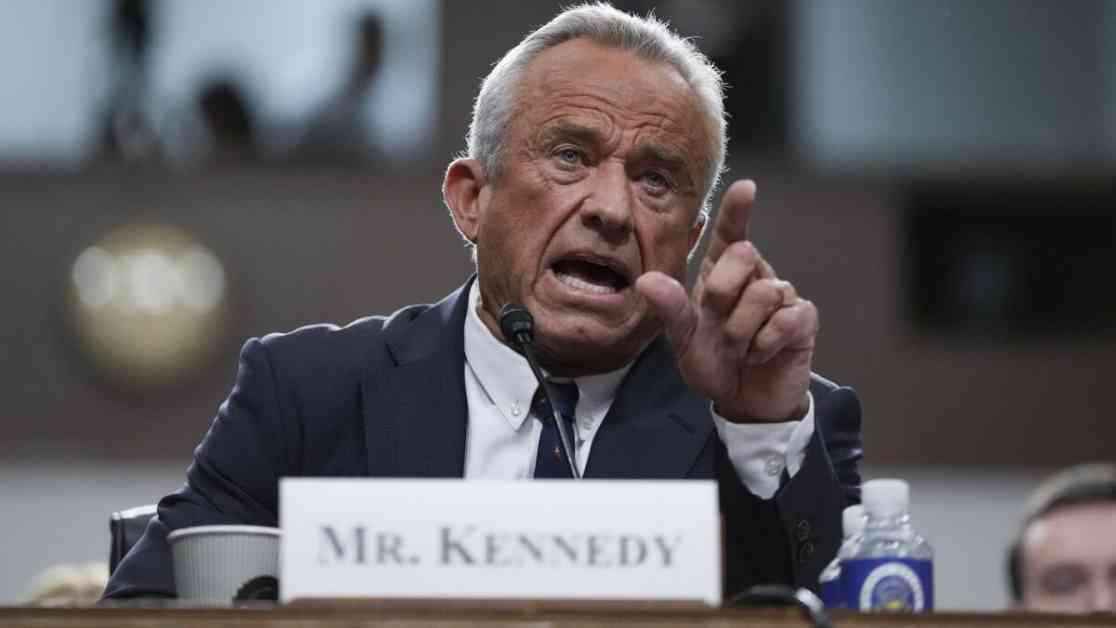Senators Grill Robert Kennedy Jr. on Vaccines During Health Secretary Confirmation Hearing
The confirmation hearing for Robert F. Kennedy Jr., President Trump’s nominee for Health and Human Services secretary, took a dramatic turn as senators probed his controversial stance on vaccines. The son of former Attorney General Robert F. Kennedy and nephew of President John F. Kennedy has been a vocal skeptic of vaccines, raising concerns among legislators about his ability to lead a crucial federal health agency.
Kennedy, a resident of Brentwood, faced a barrage of questions from senators who questioned his embrace of debunked medical claims, financial conflicts of interest, and controversial views on vaccination. The hearing, which lasted 3.5 hours, showcased the deep divide among lawmakers regarding Kennedy’s qualifications for the role.
Challenging the Status Quo
Kennedy, known for his advocacy work on environmental issues and children’s health, portrayed himself as a champion of ordinary Americans fighting against powerful interests. He emphasized his commitment to addressing the nation’s chronic health problems and his dedication to protecting America’s children. However, his past statements and actions regarding vaccines came under intense scrutiny during the hearing.
Sen. Ron Wyden, the ranking Democratic member of the Senate Finance Committee, accused Kennedy of spreading conspiracy theories and misleading the public on the safety and efficacy of vaccines. The senator pointed to Kennedy’s association with anti-vaccine activists and his role in undermining confidence in childhood vaccines. The exchanges between Wyden and Kennedy underscored the contentious nature of the confirmation process.
A Contentious Debate
The hearing also delved into Kennedy’s contradictory statements and shifting positions on important health issues. Senators raised concerns about his alleged involvement in a measles outbreak in Samoa, which resulted in the deaths of 83 individuals, mostly children under the age of 5. Kennedy denied any responsibility for the outbreak, attributing the tragic events to a series of unfortunate circumstances.
Despite facing tough questions from both Democrats and Republicans, Kennedy sought to highlight areas of common ground, such as improving nutrition and addressing substance abuse. He emphasized the need to overhaul the nation’s food supply, reduce reliance on processed foods, and promote healthy eating habits. Kennedy’s personal struggles with addiction, including a 14-year battle with heroin, resonated with lawmakers grappling with the opioid crisis and the broader issue of mental health.
The hearing also touched on Kennedy’s past political affiliations and his endorsement of President Trump in the 2024 election. Senators on both sides of the aisle sought to leverage Kennedy’s diverse background to advance their own agendas. The nominee’s willingness to engage with lawmakers from different political perspectives underscored his commitment to finding common solutions to complex health challenges.
Dr. Georges Benjamin, executive director of the American Public Health Association, expressed concerns about Kennedy’s lack of experience in healthcare and management. Benjamin questioned Kennedy’s grasp of critical health issues and his ability to lead a federal agency with a $1.8 billion budget and 90,000 employees. The nominee’s responses during the hearing left Benjamin skeptical about his commitment to evidence-based policymaking.
As the confirmation process unfolds, Kennedy’s prospects for leading the Department of Health and Human Services remain uncertain. The contentious nature of the hearing reflects the deep divisions within Congress over key health policy issues. Whether Kennedy can overcome the skepticism of lawmakers and gain their trust will determine the outcome of his nomination. The fate of America’s healthcare system hangs in the balance as the Senate deliberates on Kennedy’s fitness to serve as the nation’s top health official.


